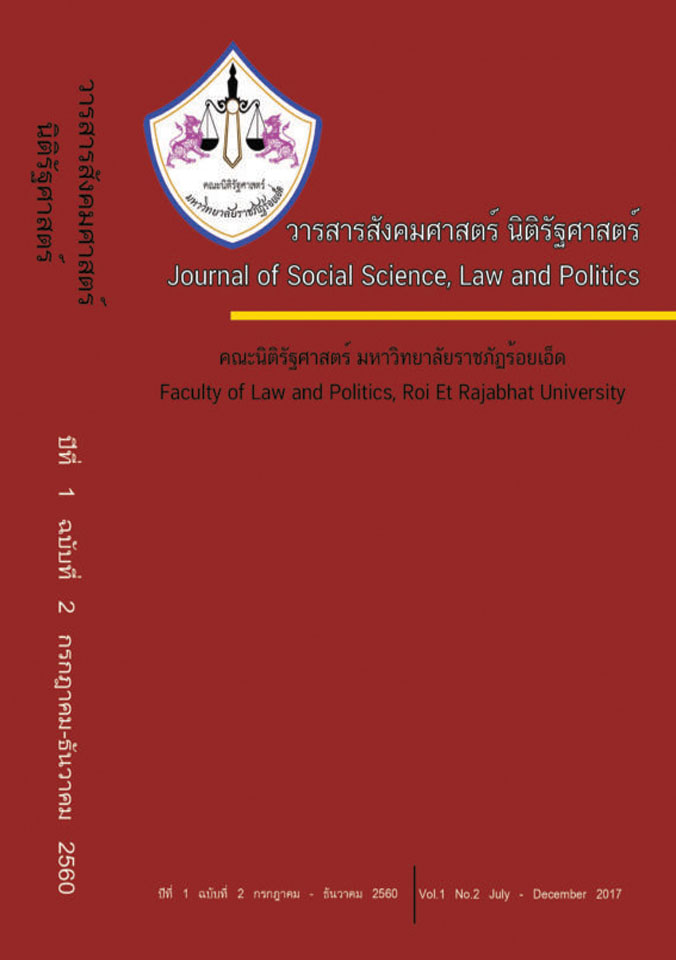การให้สัตยาบันของประเทศไทยในอนุสัญญาว่าด้วย การเลือกปฏิบัติในการจ้างงานและอาชีพ ฉบับที่ 111 ขององค์การ แรงงานระหว่างประเทศ
คำสำคัญ:
ความเท่าเทียมทางเพศ, งานที่มีคุณค่า, มาตรฐานแรงงานหลัก, อนุสัญญาว่าด้วยการเลือกปฏิบัติในการจ้างงานและอาชีพ, องค์การแรงงานระหว่างประเทศบทคัดย่อ
อนุสัญญาว่าด้วยการเลือกปฏิบัติในการจ้างงานและอาชีพ (ฉบับที่ 111) ปี ค.ศ.1958 ขององค์การแรงงานระหว่างประเทศ ครอบคลุมถึง “การเลือกปฏิบัติทางเชื้อชาติ สีผิว เพศ ศาสนา ความคิดทางการเมือง และรากฐานทางสังคม อันเป็นผลกระทบต่อความเท่าเทียมและโอกาสของการจ้างงานและอาชีพ” ในเดือนมิถุนายน ค.ศ.2017 รัฐบาลไทยตัดสินใจให้สัตยาบันอนุสัญญาฉบับที่ 111 ในที่ประชุมใหญ่แรงงานระหว่างประเทศ โดยมีเหตุผลของการให้สัตยาบันอนุสัญญาฉบับที่ 111 เพราะเป็นหนึ่งในมาตรฐานแรงงานหลัก การไม่ให้สัตยาบันจึงมีผลกระทบต่อการค้าระหว่างประเทศและการปฏิบัติที่อาจละเมิดสิทธิมนุษยชน และวาระงานที่มีคุณค่าก็ส่งเสริมให้ความเท่าเทียมทางเพศเพื่อไม่ให้เกิดการเลือกปฏิบัติ นอกจากนี้ภาคประชาสังคมและตัวแสดงภายนอกประเทศอาจกดดันให้รัฐบาลไทยให้สัตยาบันในอนุสัญญาด้วยเสรีภาพในการจัดตั้งกลุ่มหรือสมาคม (ฉบับที่ 87) ปี ค.ศ.1948 และอนุสัญญาว่าด้วยสิทธิในการรวมตัวและการเจรจาต่อรอง (ฉบับที่ 98) ปี ค.ศ.1949 ขณะที่รัฐบาลควรจะทบทวนการนานโยบายไปปฏิบัติและความร่วมมือของโครงสร้างไตรภาคี เพื่อส่งเสริมความเป็นประชาธิปไตยและสร้างความสัมพันธ์หุ้นส่วนทางสังคม
เอกสารอ้างอิง
เกษมสันต์ วิลาวรรณ. (2556). กฎหมายแรงงานสำหรับนักบริหาร. กรุงเทพฯ: วิญญูชน. พระราชบัญญัติความเท่าเทียมระหว่างเพศ พ.ศ.2558, ราชกิจจานุเบกษา เล่มที่ 132 ตอนที่ 18 ก, วันที่ 13 มีนาคม พ.ศ.2558, ค้นเมื่อ 10 พฤษภาคม 2560, จาก http://www.ratchakitcha.soc.go.th/ DATA/PDF/2558 /A/018/17.PDF
พระราชบัญญัติคุ้มครองแรงงาน พุทธศักราช 2541, ราชกิจจานุเบกษา เล่มที่ 115 ตอนที่ 8 ก, วันที่ 20 กุมภาพันธ์ พ.ศ.2541, สืบค้นเมื่อ 10 พฤษภาคม 2560, จาก http://www.labour.go.th/th/doc/law/labour_protection 2541.pdf
รัฐธรรมนูญแห่งราชอาณาจักร พุทธศักราช 2560, ราชกิจจานุเบกษา เล่มที่ 34 ตอนที่ 40 ก, วันที่ 6 เมษายน พ.ศ.2560, สืบค้นเมื่อ 10 พฤษภาคม 2560, จาก http://www.ratchakitcha.soc.go.th/DATA/PDF/ 2560/A/040/1.PDF
สำนักเลขาธิการนายกรัฐมนตรี. การประชุมของคณะรัฐมนตรี เมื่อวันที่ 9 พฤษภาคม ค.ศ.2017, สืบค้นเมื่อ 10 พฤษภาคม 2560, จาก https://media. thaigov.go.th/uploads/document/74/2017/05/docx/ 09.05.60.docx
Alcock, A. (1971). History of the International Labour Organisation. London: Macmillan.
Alston, P. (2004). ‘Core Labour Standards’ and the Transformation of the International Labour Rights Regime. European Journal of International Law, 15(3), 457-521.
Alston, P. (2005). Facing up to the Complexities of the ILO’s Core Labour Standards Agenda. European Journal of International Law, 16(3), 467-480.
Candland, C. (2009). Core labour standards under the administration of George W. Bush. International Labour Review, 148(1-2), 169-181.
Charnovitz, S. (2000). The International Labour Organization in its Second Century. Max Planck Yearbook of United Nations Law, 4(1), 147-184.
Cox, R. W. (1964). International organisations: their historical and political context. Retrieved from http://www.ilo.org/public/libdoc/ ilo/1964/64B09_95_engl.pdf
Cox, R. W. (1973). ILO: Limited Monarchy. In R. W.
Cox & H. K. Jacobson (Eds.), The Anatomy of Influence (pp. 102-138). New Haven: Yale University Press.
Cox, R. W. (1977). Labor and Hegemony. International Organization, 31(3), 385-424.
Cox, R. W. (2013). Universal Foreigner: The Individual and the World. World Scientific.
Dahl, K. N. (1968). The Role of I.L.O. Standards in the Global Integration Process. Journal of Peace Research, 5(1), 309-351.
General Assembly. (1948). The Universal Declaration of Human Rights: United Nations. Retrieved http://www.ohchr.org/EN/UDHR/ Documents/UDHR_Translations/ eng.pdf
General Assembly. (1965). Convention on the Elimination of All Forms of Racial Discrimination. Retrieved from http://www.ohchr.org/ Documents/ ProfessionalInterest /cerd.pdf
General Assembly. (1979). Convention on the Elimination of All Forms of Discrimination Against Women. Retrieved from http://www. ohchr.org/Documents/Professional Interest/cedaw.pdf
Governing Body. (2015). Agenda of the International Labour Conference (2017-2019). 323rd Session. Retrieved from http://www. ilo.org/wcmsp5/groups/public/ed_norm/--- relconf/documents/meetingdocument/wcms_348401.pdf
Hansenne, M. (1994). Promoting Social Justice in the New Global Economy. Monthly Labor Review, 117(9), 3-4.
Hepple, B. (2005). Labour Law and Global Trade. Oxford: Hart.
Locke, R. M. Amengual, M. & Mangla A. (2009). Virtue out of Necessity? Compliance, Commitment, and the Improvement of Labor Conditions in Global Supply Chains. Politics & Society, 37(3), 319-351.
International Labour Conference. (1956). Discrimination in the Field of Employment and Occupation: Seventh Item on the Agenda. 40th Session. Retrieved from http://staging. ilo.org/public/libdoc/ conventions/Fundamental_Conventions/Convention_no._111/111_English/56B09_37_engl.pdfilo.org/public/libdoc/conventions/Fundamental_Conventions/Convention_no._111/111_English/56B09_37_engl.pdf
International Labour Conference. (1959). Record of Proceedings. 42nd Retrieved from http://staging.ilo.org/public/libdoc/ conventions/Fundamental_ Conventions/Convention_no. _111/111_English/09616(1958-42)Votes.pdf
ILO. (1923). Official Bulletin: Volume 1 April 1919 -1920. Geneva: ILO. Retrieved from http://www.ilo.org/public/enlish/bureau/leg/download/partxiii-treaty.pdf
ILO. (1944). Declaration Concerning the Aims and Purposes of the International Labour Organisation (Declaration of Philadelphia). Retrieved from http://www.ilo.org/dyn/normlex/en/f? p=1000:62:0::NO:62:P62_LIST_ENTRIE_ID:2453907:NO#declaration
ILO. (1958). Discrimination (Employment and Occupation) Convention, 1958 (No.111), Retrieved from http://staging.ilo.org/public/libdoc/ conven tions/Fundamental_ Conventions/Convention_no._111/ 111_ English/ C111_Discrimination.pdf
ILO. (1964). Declaration Concerning the Policy of “Aparthied” of the Republic of South Africa. Geneva: ILO.
ILO. (1969). The World Employment Programme. Geneva: ILO.
ILO. (1972). Employment, Incomes and Equality: A Strategy for Increasing Productive Employment in Kenya. Geneva: ILO.
ILO. (1975). Declaration on Equality of Opportunity and Treatment for Women Worker. Geneva: ILO.
ILO. (1976). Employment, Growth and Basic Needs: A One-World Problem. Geneva: ILO.
ILO. (1994a). Defending Values, Promoting Change (Social Justice in a Global Economy: An ILO Agenda). Geneva: ILO.
ILO. (1994b). Vision of the Future of Social Justice: Essay on the Occasion of the ILO’s 75th Anniversary. Geneva: ILO.
ILO. (1995). Follow-up to the World Summit for Social Development. Geneva: ILO.
ILO. (1999). Decent Work. Geneva: ILO.
ILO. (2007a). Eliminating Discrimination Against Indigenous and Tribal Peoples in Employment and Occupation: A Guide to ILO Convention No. 111. Geneva: ILO.
ILO. (2007b). Equality at Work: Tacking the Challenges. Geneva: ILO.
ILO. (2010a). Constitution of the International Labour Organization. Geneva: ILO.
ILO. (2010b). ILO Declaration on Fundamental Principles and Rights at Work and Its Follow-Up. Geneva: ILO.
ILO. (2013). Towards the ILO centenary: realities, renewal and tripartite commitment. Geneva: ILO.
ILO. (2016). Non-Standard Employment around the World: Understanding Challenge, Shaping Prospects. Geneva: ILO. ILO. (2017). Ending Violence and Harassment Against Women and Men in the World of Work. Geneva: ILO.
Imber, M. F. (1989). The USA, ILO, UNESCO and IAEA: Politicization and Withdrawal in the Specialized Agencies. New York: Springer.
Maul, D. (2012). Human Rights, Development and Decolonization: The International Labour Organization, 1940-70. New York: Palgrave Macmillan.
Maupain, F. (2009). New Foundation or New Façade? The ILO and the 2008 Declaration on Social Justice for a Fair Globalization. European Journal of International Law, 20(3), 823-852.
Maupain, F. (2013). The Future of the International Labour Organization in the global economy. Oxford: Hart.
Morse, D. A. (1968). The World Employment Programme. International Labour Review, 97(6), 517-524.
Morse, D. A. (1969a). The Origin and Evolution of the I.L.O. and Its Role in the World Community. New York: Cornell University.
Nielsen, H. K. (1994). The Concept of Discrimination in ILO Convention No.111. The International and Comparative Law Quarterly, 43(1), 827-856.
Plasa, W. (2015). Reconciling International Trade and Labor Protection: Why We Need to Bridge the Gap between ILO Standards and WTO Rules. London: Lexington Books.
Promotion of Equality Department Equality of Rights Branch. (1984). ILO Standards and Action for the Elimination of Discrimination and the Promotion of Equality of Opportunity in Employment. Retrieved from http://staging.ilo.org/public/libdoc/ilo/1984/84B09_262 _engl.pdf
Rodgers, J., Lee, E., Swepston, L. & Van Daele, J. (2009). The International Labour Organization and the Quest for Social Justice 1919-2009. Geneva: ILO.
Shelton, D. (2009). Soft Law. In D, Armstrong (Ed.), Routledge Handbook of International Law. (pp. 68-80). Oxon: Routledge.
Sheppard, C. (2012). Mapping Anti-Discrimination Law onto Inequality at Work: Expanding the Meaning of Equality. International Labour Law, 151(1-2), 1-19.
Standing, G. (2008). The ILO: An agency for globalization?. Development and Change, 39(3), 355-384.
Tomei, M. (2003). Discrimination and Equality at Work: A Review of the Concepts. International Labour Review, 142(4), 401-418.
United Nations. (1966). International Convent on Economic, Social, Cultural Rights. Retrieved from https://treaties.un.org/doc/ publication/unts/volume%20999/volume-999-i-14668-english.pdf
United Nations Educational, Scientific and Cultural Organization. (1960). Convention Against Discrimination in Education. Retrieved from http://www.unesco.org/education/pdf/ DISCRI_E.PDF
Verick, S. (2017). Transformation of Women at Work in Asia. Retrieved from http://www.unescap.org/sites/default/files/Session% 203%20-%20Sher%20Verick.pdf
Verma, A., & Elman, G. (2007). Labour Standards for a Fair Globalization for Workers of the World. The Good Society, 16(2), 57-64.
Vosko, L. F. (2002). Decent Work: The Shifting Role of the ILO and the Struggle for Global Social Justice. Global Social Policy, 2(1), 19–46.
Vosko, L. F. (2010). Managing the Margins: Gender, Citizenship, and the International Regulation of Precarious Employment. New York: Oxford University Press.
Wisskirchen. A, (2005). The Standard-Setting and Monitoring Activity of the ILO: Legal Questions and Practical Experience. International Labour Review, 144(3), 253-289.
World Trade Organization. (1996). Singapore Ministerial Declaration. Retrieved https://www.wto.org/english/thewto_ e/minist_e/min96_e/singapore_declaration96_e.pdf
ดาวน์โหลด
เผยแพร่แล้ว
รูปแบบการอ้างอิง
ฉบับ
ประเภทบทความ
สัญญาอนุญาต
บทความที่ได้รับการตีพิมพ์เป็นลิขสิทธิ์ของวารสารสังคมศาสตร์ นิติรัฐศาสตร์ มหาวิทยาลัยราชภัฎร้อยเอ็ด
ความคิดเห็นในบทความและงานเขียน ซึ่งตีพิมพ์ในวารสารฉบับนี้ เป็นความคิดเห็นส่วนบุคคลของผู้ประพันธ์โดยอิสระ กองบรรณาธิการ วารสารสังคมศาสตร์ นิติรัฐศาสตร์ไม่จำเป็นต้องเห็นด้วยเสมอไป หากท่านประสงค์จะนำบทความหรืองานเขียนเล่มนี้ไปตีพิมพ์เผยแพร่ จะต้องได้รับอนุญาตจากผู้ประพันธ์ตามกฎหมายว่าด้วยลิขสิทธิ์




